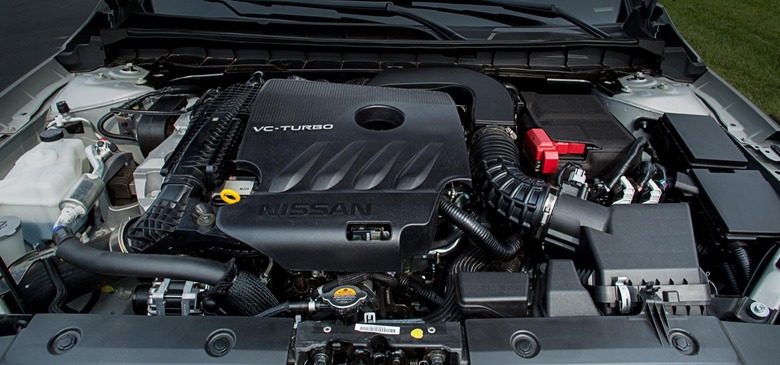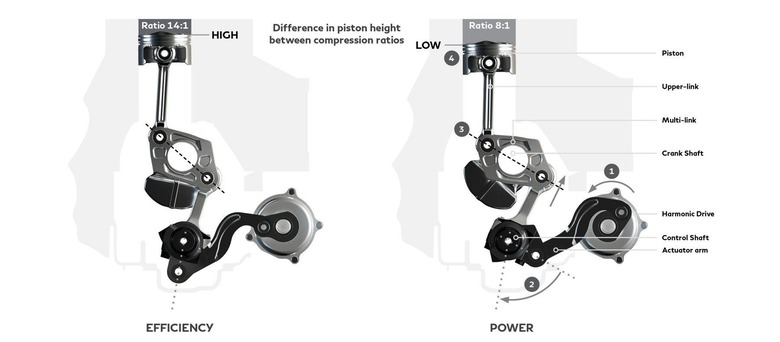The 2019 Altima has a secret weapon
The new 2019 Nissan Altima is affordable, carries a whole host of new tech, and is far more memorable to look at than its predecessor, but the smartest upgrade you need to lift the hood to see. While the new Altima's standard engine may be a 2.5-liter naturally-aspirated four cylinder, Nissan saves the real magic for the upgrade option.
Nissan calls it VC-Turbo, though it saved the new engine for its luxury Infiniti arm first. The 2019 Altima is the first showing for the drivetrain with the Nissan badge on the nose, in fact. Though it's smaller in capacity terms, at 2.0-liters, than the standard engine, it still comes with some significant improvements.
It's the Jekyll and Hyde of engines
The VC-Turbo isn't, of course, the first turbocharged engine. That technology – forced induction, where air is forced into an internal combustion engine – dates back to 1885, in fact, and Gottlieb Daimler. Usually, however, turbochargers work at a single pressure.
In a naturally aspirated engine, like the old V6 which the VC-Turbo replaces in the 2019 Altima, intake gases are pulled in when the pistons complete their downward stroke. A turbocharger pulls in ambient air and compresses it, forcing it in at a higher pressure. The exact pressure that the engine is designed for depends on what the engineers want to achieve.

If you want maximum fuel economy, you want a bigger compression ratio. If you want higher performance, however, you want a smaller compression ratio. What sets Nissan's VC-Turbo apart is that it isn't set to one, fixed compression ratio, but can in fact change them.
Change the compression, change the character
At the one extreme, the VC-Turbo uses a 14:1 ratio to deliver the most fuel efficiency possible. In fact, Nissan says, the engine can deliver diesel-like economy, only without diesel-style emissions.

At the other end of the scale, though, the VC-Turbo can use an 8:1 ratio. That's intended for maximum performance. What's important is that Nissan's engine isn't forced to choose one extreme or the other. In fact, it can switch between any compression ratio that falls between 14:1 and 8:1, depending on the current driving conditions.
How economical, we don't yet know
One of the headline features of the VC-Turbo is fuel economy. Nissan isn't spilling the details on EPA figures for the 2019 Altima yet, but has promised a double-digit improvement over the 3.5-liter V6 in the outgoing car. That was rated for 22 mpg in the city, and 32 mpg on the highway.
That's despite torque being higher, as well. The old V6 managed 270 horsepower and 251 lb-ft of torque. This new VC-Turbo engine is down a little on horsepower, at 248 hp, but beats the V6 on torque, at 280 lb-ft.
There's one main downside
After all that, you'd be forgiven for assuming that the 2.0-liter VC-Turbo was the engine to have, even if it does cost a $4k premium over the standard naturally-aspirated 2.5-liter. Unfortunately, there is a compromise you have to make. Nissan is, with the 2019 Altima, offering all-wheel drive for the first time. Sadly you can't have both that and the trick turbo, though.
In fact, there'll only be three configurations of the new car with the VC-Turbo, the 2019 Altima SR, Altima Platinum, and Altima Edition ONE. The latter is a limited-run intended just for the first year of cars, too. Each comes with front-wheel drive.
The proof is on the road
Exactly how well the VC-Turbo Altima will sell remains to be seen. With its price premium and no AWD option the market is undoubtedly smaller than for the cheaper, more flexible 2.5-liter car. Nonetheless, the appeal of more power and all that fiendishly clever engineering may well appeal to the tech-savvy drivers out there. We'll know for sure when the 2019 Altima hits dealership forecourts this fall.
